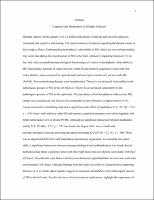Please use this identifier to cite or link to this item:
https://hdl.handle.net/20.500.12202/8325| Title: | Cognition and Handedness in Multiple Sclerosis |
| Authors: | Foley, Frederick W. Barr, William B. Zemon, Vance Miller, Jennifer R. |
| Keywords: | psychology nanoscience Assessment Epilepsy Intelligence Language Disorders Lateralization Multiple Sclerosis |
| Issue Date: | Aug-2020 |
| Publisher: | Yeshiva University |
| Citation: | Miller, J.R. (2020, August). Cognition and Handedness in Multiple Sclerosis (Publication No. 29260426) [Doctoral dissertation, Yeshiva University]. ProQuest Dissertations & Theses Global. |
| Series/Report no.: | Ferkauf Doctoral Dissertations;Pub. No. 29260426 |
| Abstract: | Multiple sclerosis (MS) impacts over 2.5 million individuals worldwide and can affect physical, emotional, and cognitive functioning. Yet, much remains to be known regarding the disease course in this complex illness. Understanding hemispheric vulnerability in MS, which has not yet been studied, may aid in elucidating the manifestation of MS in the brain, ultimately impacting treatment. To do this, this study assessed neuropsychological functioning as it relates to hemispheric vulnerability in MS. Specifically, domains of verbal and non-verbal IQ and memory acquisition, along with fine-motor abilities, were compared in right (dextral) and non-right (non-dextral) persons with MS (PwMS). Two contradicting theories were hypothesized: Theory A, an increased vulnerability to the pathological process of MS in the left brain or, Theory B, an increased vulnerability to the pathological process of MS in the right brain. The prevalence of left-handedness in the current MS sample was assessed and was found to be comparable to prior literature, at approximately 9.1%. Linear mixed effects modelling indicated a significant main effect of handedness F(1, 195.35) = 3.95, p = .048 when verbal and non-verbal IQ and memory acquisition measures were taken together, with better performance seen in dextral PwMS. Although no significant interaction between handedness and IQ F(3, 525.60) = 0.75, p = .523 was found, the largest effect size existed in the neuropsychological measure assessing perceptual reasoning IQ F(1,341) = 12.163, p = .001. There was no significant difference with handedness and memory acquisition. In evaluating fine motor skills, a significant interaction between neuropsychological test and handedness was found; dextral participants had faster completion time (with their right hand) than non-dextral individuals (with their left hand). Non-dextrals were faster with their non-dominant (right) hand than dextrals were with their non-dominant (left) hand. Although findings from this study are relatively inconsistent in supporting Theories A or B, results taken together suggest an increased vulnerability to the pathological process of MS in the left brain. Results also have clinical treatment implications, highlight the importance of choosing the right neuropsychological measure, and may indicate differences between cognitive profiles of males and females with MS. |
| Description: | Doctoral dissertation, PhD / Open Access |
| URI: | https://hdl.handle.net/20.500.12202/8325 https://ezproxy.yu.edu/login?url=https://www.proquest.com/dissertations-theses/cognition-handedness-multiple-sclerosis/docview/2697677784/se-2?accountid=15178 |
| ISBN: | 9798837525827 |
| Appears in Collections: | Ferkauf Graduate School of Psychology: Doctoral Dissertations |
Files in This Item:
| File | Description | Size | Format | |
|---|---|---|---|---|
| Miller_FinalEditedDissertation_9.9.20 OA.pdf | 732.53 kB | Adobe PDF |  View/Open |
This item is licensed under a Creative Commons License

